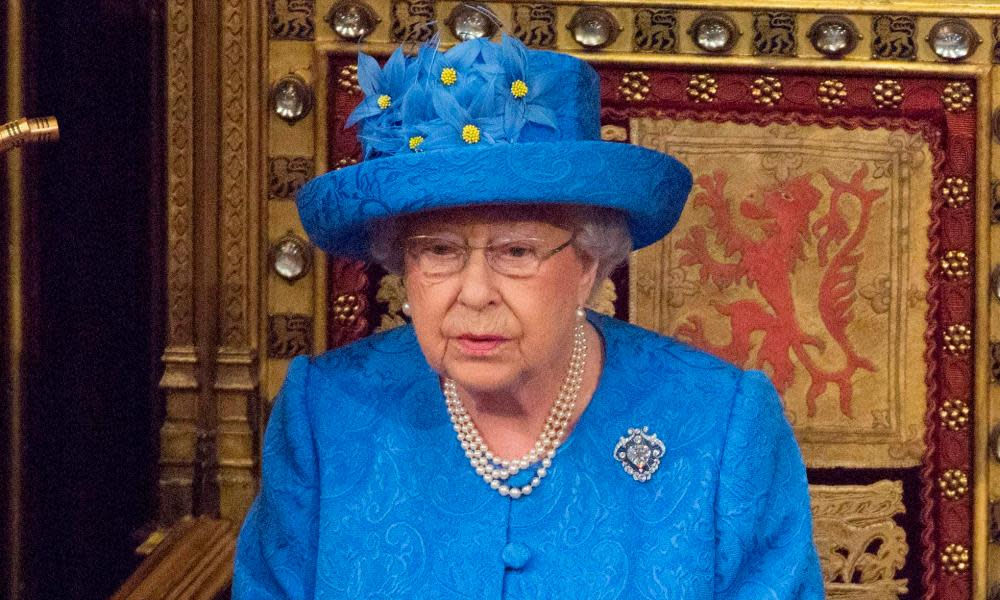The Guardian view on the Queen’s speech: In office but not in power | Editorial

Westminster in the record-breaking high heat of midsummer. The elderly Queen opening parliament for the 64th time in this longest of royal reigns. A crowded and noisy Commons chamber, with the party leaders straining to make their points across the despatch box. The unwary, catching the event on the television news afterwards, may have got the impression today that this was all very familiar, that the 2017 Queen’s speech marks the resumption of British political business as usual. Yet the unwary would be very wrong.
British politics were radically recast on 8 June. The new political landscape is different in almost every way bar the names of the two main party leaders. The Conservatives are in office but not in power. Labour is in one-more-heave mode for the first time since the 1990s. The SNP challenge has retreated though not ended. In this hung parliament, shaped by what is now a minority government, this was a Queen’s speech from a humbled Tory party under a leader whose authority has suddenly drained away.
Everything about the first day of the new parliament underlined the fragile conditionality of the new order. The Queen dispensed with the usual robes and symbols, sporting instead a hat that echoed the European flag and set Twitter chirping. The speech was short, and would have been lightweight, especially for a mooted two-year session, were it not for the Brexit legislation that bulked it out. Peggy Lee’s song Is That All There Is? came irresistibly to mind.
Tory MPs, still shocked at the loss of their majority, managed to do their collective duty by rallying behind Theresa May, feeding her with questions planted by the whips. The prime minister, clearly nervous, was careful and conciliatory – her tone set by a striking apology for central and local government’s lamentable response to the Grenfell Tower fire. Behind that public apology lurked another, unspoken this time but delivered to her party a week ago, for failing to deliver the majority she promised. That failure had produced an emboldened Labour opposition, whose leader Jeremy Corbyn displayed far greater flair and confidence in his speech than any he has made since 2015.
When a government has a majority, a Queen’s speech sets out the ways it seeks to change the country. This one, by contrast, contained only what the whips think they can get away with to stay in office. The list of bills was a radically emaciated version of the Conservative manifesto. Grammar schools dumped. The scrapping of the Serious Fraud Office abandoned. Foxes left to run free. The winter fuel allowance surviving. Prison reform pointlessly scrapped. Other campaign pledges had been downgraded from certainties to possibilities, about which there will merely be consultation – on social care above all, ditto the energy bill cap. Talk of an industrial strategy continues, but measures remain over the horizon. Counter-terrorism will be reviewed, as will mental health laws, though defence remains unexamined. The King of Spain will make a state visit, but of President Trump’s trip there was not a word.
The speech contained no clues about the putative deal with Northern Ireland’s DUP. Talks continued today, but the mood on both sides is getting irritable. What must have seemed to Mrs May like a good idea on 9 June now looks increasingly vexed, as it deserves to. The Ulster party is driving a hard bargain of cash for votes that sends an embarrassing message to Tory modernisers. Mrs May should cut her losses and trash the plan.
On the two great issues of the moment Mrs May said little that was new. Brexit will dominate the legislative agenda for the coming 18 months, but the once-trumpeted repeal bills are now shrouded in extra layers of uncertainty. The government’s EU goals remain obscure, so the legislation will contain as many unresolved clauses as there are holes in a Swiss cheese until they are clarified. Things are no better where austerity is concerned. Facing demands for extra spending on health, care, police and schools as well as pay, Philip Hammond may be eyeing a modest reset in his autumn budget. But the government may struggle to last that long. It revealed today that the UK budget deficit is set to expand not reduce this year.
The Queen’s speech reveals a government without a clear mandate, lacking a clear plan and led by a prime minister whose stock is on the floor. It is frightened of taking sensible action on both Brexit and public spending. Its programme poses an unanswered question: What is the point of this? Unless Mrs May can supply a better answer than she offered today, it looks a doomed enterprise.

 Yahoo News
Yahoo News 
